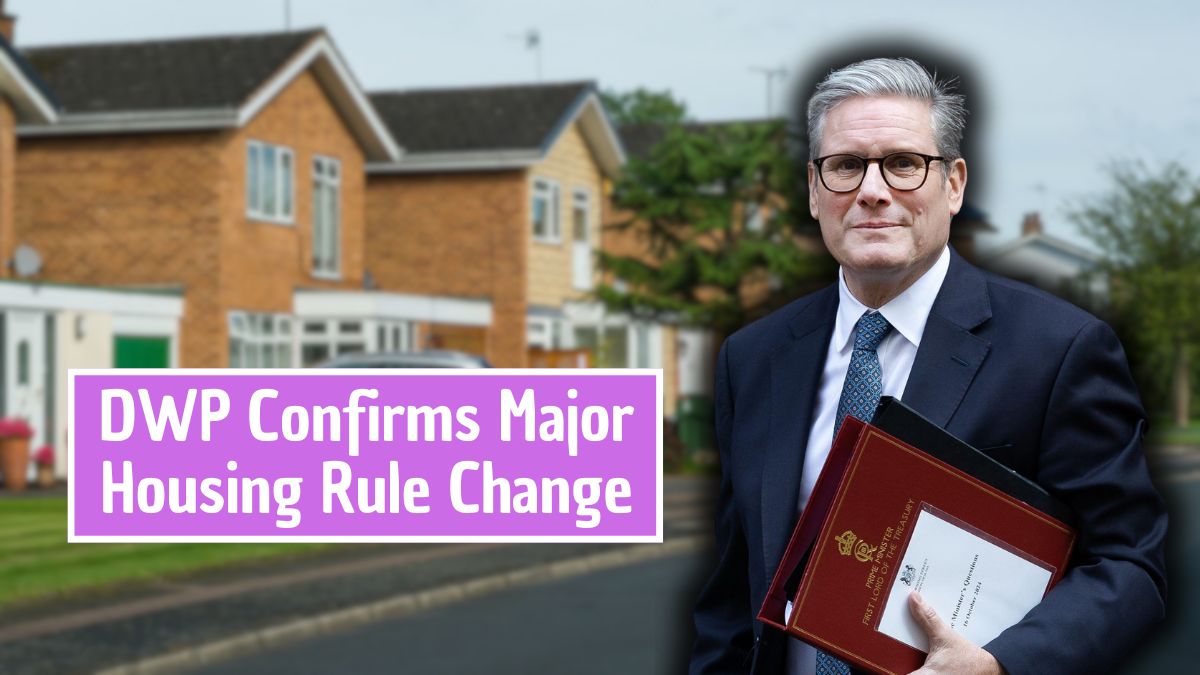The Department for Work and Pensions (DWP) has announced new housing rules for UK pensioners, set to take effect on 25 October 2025. This marks one of the most significant updates in years, aimed at easing the financial strain caused by rising rent and housing costs.
The reforms are designed to ensure that older citizens — particularly those on fixed or limited incomes — have better access to affordable, stable accommodation. The DWP says the new system will deliver simpler applications, wider eligibility, and more accurate benefit calculations to help pensioners stay secure in their homes.
Why the DWP Is Changing Housing Rules

The announcement follows growing concern over the cost of living pressures faced by the UK’s ageing population. Many pensioners have struggled to keep up with rent and utility bills, especially in high-demand areas where housing prices have outpaced inflation.
The DWP’s policy update is part of a broader strategy to improve financial security for seniors, aligning with government commitments to reduce pensioner poverty and strengthen welfare support systems.
Key Housing Rule Changes Taking Effect in October 2025
The reforms introduce three major updates that directly affect how housing assistance is managed for pensioners:
- Simplified Application Procedures – Pensioners will face fewer forms and faster approval processes, reducing bureaucratic barriers.
- Expanded Eligibility – More pensioners on modest or fixed incomes will qualify for housing assistance.
- Revised Rent Coverage Calculations – Adjustments will be made to ensure benefits more accurately reflect real rental market conditions.
According to the DWP, these reforms aim to create a fairer, more accessible system that prioritises financial dignity and stability for the elderly.
Eligibility for Housing Support: Who Qualifies
Under the new rules, eligibility will be expanded to include a wider group of pensioners living in both private rentals and social housing. Key criteria include:
- Being aged 66 or above (aligned with the current State Pension age).
- Proof of residency in the United Kingdom.
- Demonstrated income below the government’s housing support threshold.
This update ensures that more seniors who rely solely on State Pension or modest savings can receive vital assistance.
The DWP has emphasised that no pensioner should face housing insecurity due to outdated eligibility limits.
Simplified Access and Application Process
The DWP has pledged to streamline how pensioners apply for housing support. The traditional application process — often criticised for being confusing and paperwork-heavy — will be replaced with simplified digital and local authority systems.
Applications will be available online, by post, or through local council offices, making it easier for pensioners of all digital skill levels to access help.
Local authorities will receive dedicated training and funding to ensure smooth transitions to the new framework.
How Pensioners Will Benefit
The 2025 housing reform brings several tangible benefits for pensioners:
- Reduced Rent Burden: More rent costs will be covered under revised benefit calculations.
- Simpler Process: Less paperwork and faster approvals mean pensioners won’t be left waiting months for decisions.
- Increased Independence: Financially vulnerable pensioners can live comfortably without relying on family support or loans.
- Greater Stability: Predictable rent contributions will make it easier to budget and plan for the long term.
The government believes these measures will significantly reduce housing-related anxiety among older citizens, particularly those living alone or in private rental accommodation.
Private Renters: Expanded Support and Protection
Pensioners renting privately often face the highest costs and the most uncertainty. Under the new DWP rules, this group will receive enhanced protection and financial relief.
Key benefits include:
- Higher Housing Benefit Contributions toward private rents.
- Simplified Rent Assessment to reflect actual market values.
- Flexible Eligibility that accounts for pensioners with modest savings or small private pensions.
The DWP hopes this will prevent unnecessary relocations and reduce the number of elderly tenants facing eviction due to rising rents.
Social Housing Tenants: Clearer and Fairer Calculations
For those living in council or social housing, the DWP’s reforms provide standardised rent calculations and improved transparency.
Under the new system:
- Local authorities will follow uniform assessment guidelines to prevent regional disparities.
- Faster processing times will ensure housing support payments reach pensioners without delays.
- Pensioners requiring home adaptations or mobility assistance will find it easier to secure funding through coordinated council support.
This approach is designed to make housing assistance consistent and fair nationwide, regardless of postcode.
Role of Local Authorities
Local councils will play a central role in implementing the October 2025 changes. They must:
- Upgrade internal systems to handle the revised benefit formulas.
- Train staff to understand the new eligibility and assessment processes.
- Monitor performance and report back to the DWP on effectiveness.
This partnership between central government and local authorities is essential to ensure that pensioners receive accurate and timely assistance.
Encouraging Financial Planning Among Pensioners
With the new rules on the horizon, pensioners are encouraged to review their finances and prepare for the transition.
Here are practical steps they can take before October 2025:
- Check eligibility under the new housing rules using the DWP’s online tools.
- Calculate potential rent support changes based on income and location.
- Contact local councils or welfare advisers for personalised guidance.
- Gather proof of income, age, and residency to ensure smooth application processing.
Proper preparation will help pensioners take full advantage of the expanded benefits when the reforms come into force.
Government Statement: A Long-Term Commitment
The DWP has described the policy as part of a long-term strategy to strengthen pensioner welfare.
A spokesperson for the department said:
“Our priority is to ensure that every older person in the UK has a safe, affordable home. These reforms simplify access, improve fairness, and guarantee dignity for our pensioners.”
Officials have also confirmed that the DWP will periodically review benefit rates to ensure they remain aligned with housing market fluctuations.
Reactions from Pensioner Groups and Charities
Initial feedback from pensioner advocacy groups and housing charities has been broadly positive.
Organisations such as Age UK and Independent Age have welcomed the simpler procedures and expanded coverage, which they say will make a real difference to low-income pensioners.
However, campaigners have also urged the government to monitor implementation carefully, warning that delays or administrative backlogs could still leave vulnerable pensioners at risk.
Housing charities have further recommended that future adjustments keep pace with inflation, ensuring benefits retain their real-world value.
How to Apply for Housing Support
Pensioners looking to benefit from the new housing support can prepare now by understanding the steps involved:
- Gather Documentation: Proof of age (State Pension letter or ID), income statements, and residency proof.
- Complete the Application: Forms will be available online through GOV.UK, local councils, or DWP offices.
- Submit and Track: Submit the completed application and track progress through local authority portals.
- Respond Promptly: Provide any additional details requested to avoid delays.
The DWP encourages early submission once the system opens to ensure that benefits begin promptly when the new rules start on 25 October 2025.
Frequently Asked Questions (FAQs)
1. When do the new DWP housing rules come into effect?
The updated housing support system for pensioners begins on 25 October 2025.
2. Who qualifies for housing support under the new rules?
Pensioners aged 66 and above living in the UK with income below the DWP’s defined threshold will be eligible for support, including those in private rentals and social housing.
3. Will private renters receive more help?
Yes. Pensioners renting privately will see increased housing benefit contributions and simplified rent assessments to reflect true market costs.
4. How can I apply for housing support?
Applications can be made online, by post, or through local councils. Pensioners should gather proof of income, residency, and age before applying.
5. What should pensioners do before October 2025?
Review your financial situation, check eligibility, and prepare documentation early to ensure a seamless transition once the new system launches.
















